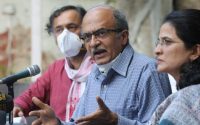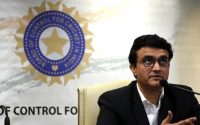Supreme Court discusses ‘voluntary code of conduct’ for Cabinet Ministers.
Source – thehindu.com
A Constitution Bench of the Supreme Court is hearing arguments on whether Cabinet Ministers at both the Central and State levels should have a “voluntary model code of conduct” which addresses their private and public activities.
The submissions about such a code were made before the five-judge Bench led by Justice Arun Mishra, which is examining if “greater restrictions” should be imposed on the right of free speech and expression of high public functionaries to protect the citizen’s fundamental right to lead a dignified life.
Two petitions
The question was framed after family members of the Bulandshahr rape case victim complained about former Uttar Pradesh Minister Azam Khan’s public statements that the rape case was part of a political conspiracy against the then Akhilesh Yadav government. The Bench is also hearing a separate petition filed by a Kerala-based man, Joseph Shine, represented by senior lawyer Kaleeswaram Raj, about the public comments made by State Minister M.M. Mani.
Both Attorney General K.K. Venugopal and Mr. Raj, who are assisting the Constitution Bench, were against introducing additional restrictions.
Mr. Venugopal argued that the SC has taken a consistent stand in the past against invocation of any further restrictions on free speech of citizens, and public men are no exception.
Mr. Raj asked the court to direct the government to frame the code of conduct for Cabinet Ministers.
“The code of conduct should reflect constitutional morality and values of good governance. The acts of the persons holding public offices can be thus subjected to better and meaningful public scrutiny, which in turn would ensure democratic accountability,” Mr. Raj argued before the Constitution Bench.
He said the Union Ministry of Home Affairs has already a code of conduct for Ministers, which essentially is concerned about financial discipline. “Nothing is emanating from the code which addresses the private and public activities of the Ministers in general. This is too narrow and inadequate,” the senior lawyer argued.



